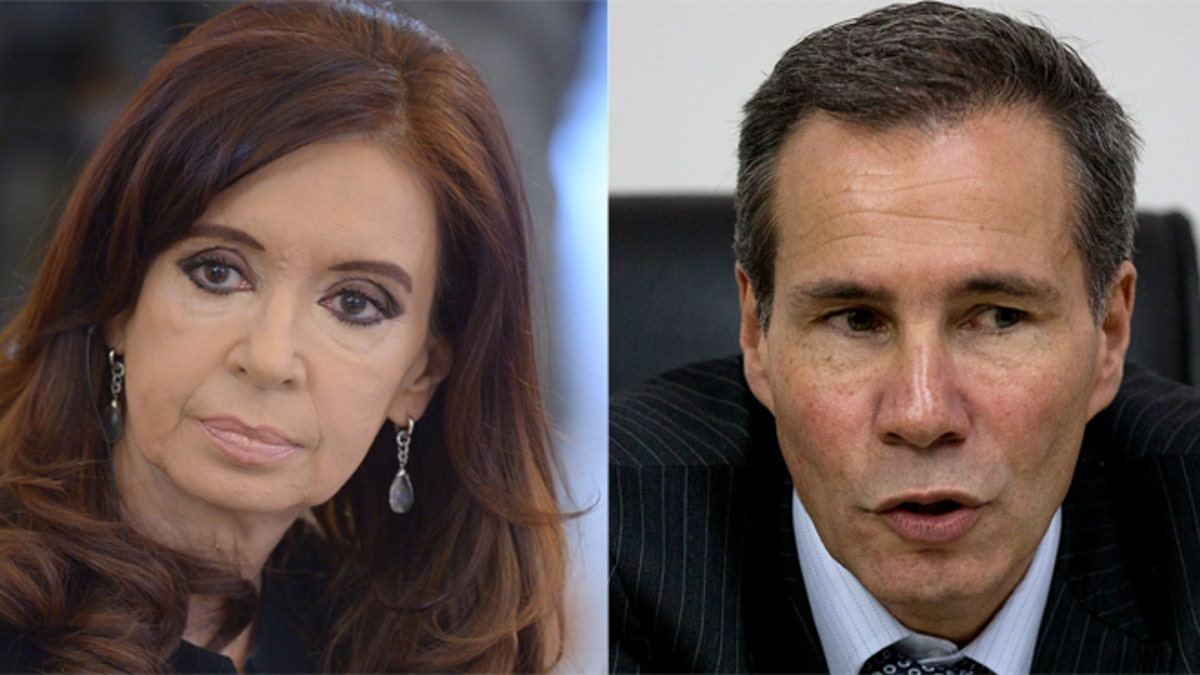
The controversy surrounding the death of a crusading Argentinian prosecutor continued to unfurl as the country’s president – herself embroiled in the scandal – weighed in Thursday morning on the alleged suicide and new reports surfaced about a contentious deal between the Southern Cone nation and Iran that the lawyer was investigating.
Argentinian President Cristina Fernández de Kirchner cast doubt that a special prosecutor investigating the 1994 bombing of a Jewish Community Center in Buenos Aires killed himself before he was scheduled to testify in the bombing case. Prosecutor Alberto Nisman had been looking into allegations that Argentina struck a deal with Iran to drop charges against eight Iranians charged in the attack, which killed 85 people.
“The questions now become facts,” Kirchner said in a letter that she posted on Twitter. “The suicide (I'm convinced) was not suicide.”
Nisman was found late Sunday in his Buenos Aires apartment lying on the bathroom floor next to a .22-caliber handgun and a bullet casing.
Nisman’s report of the AMIA case, which was released Tuesday night, revealed intercepted conversations between representatives of the Iranian and Argentinian governments that point to a long pattern of secret negotiations between the two nations. The transcripts appear to reveal that Argentina struck a deal to receive oil from Iran and in return would shield the Iranians involved in the bombing from prosecution. Iran would also receive beef and grains from Argentina.
“He’s very interested in exchanging what they have for grains and beef,” Luis D’Elía, an Argentinian union leader and influential supporter of President Fernandez said in one transcript from 2013, referring to a powerful Argentinian minister with whom he had just met.
The deal, however, never materialized as Argentina was unable to persuade Interpol to lift its "red notices" for the arrest of five of the Iranians, and the government said trade with Iran had diminished in recent years.
Nisman’s death was ruled a suicide by Viviana Fein, the lead investigator in the case. She said Monday there were no indications anyone else was involved. The apartment's door was locked from the inside and there were no signs it had been forced open, she said.
But family and friends of Nisman immediately rejected the finding and protesters took to the streets demanding justice for the prosecutor, who had spent 10 years investigating the nation's deadliest terror attack ever.
Fernandez de Kirchner, who at first was adamant that Nisman had indeed committed suicide, made an abrupt change of face early Thursday. In her letter, she questioned why the prosecutor would take his life only hours before releasing his report about the bombing.
“Why would he kill himself when he enjoyed being a prosecutor and he and his family had an excellent quality of life?” she wrote, according to the letter published in the Argentinian newspaper La Nación. “Why would he borrow a gun to commit suicide when the prosecutor has two weapons registered in his name?”
The president’s letter suggested that Nisman was being fed false evidence by groups who then killed him to cast aspersion on her government.
From the beginning, on social media and throughout the world, many questioned whether Nisman killed himself.
No suicide note was found and a test of Nisman's hand showed no gunpowder residue, though the investigator said that may have been due to the small caliber of the gun. Also feeding suspicion was the rapid appearance of national Security Secretary Sergio Berni at the apartment, since he is a government, not a judicial, official. He denied allegations that he altered the crime scene.
Then the locksmith who opened the back door to give investigators access to Nisman's apartment said it hadn't been properly locked, raising speculation about whether a killer might have entered or exited the 13th-story apartment.
After testifying to investigators on Tuesday, the locksmith, who gave his name to journalists only as Walter, said he was called to let authorities into Nisman's apartment.
The front door had a keyless system so he decided to go in through the service door. Authorities said Monday that Nisman's mother hadn't been able to open the service door because a key was in the lock on the other side.
"The service door wasn't closed. I simply pushed the key and entered in two minutes," the locksmith told reporters.
He said he was able to quickly open the door with the help of a hook. "It took me longer to pack up my things (tools) than to open the door."
He added, "If someone entered or not, I don't know."
The official news agency Telam, meanwhile, said investigators had found a third access to the home, a narrow passage holding air conditioning equipment that connects to a neighboring apartment occupied by an unidentified foreigner. They were investigating a seemingly recent footprint and fingerprint found inside.
Fein said the gun found beside Nisman was registered to another man, Diego Lagomarsino, described by officials as a colleague of Nisman, who had given it to him.
The death, and Tuesday's release of Nisman's full report, has caused a crisis for the government, which scrambled to promise "maximum transparency and cooperation" in the investigation.
Iranian officials have remained quiet amid Nisman’s investigation and death, with the country’s Fars news agency and Islamic Republic News Agency (IRNA) not reporting on the story.
Writing with passion in his report, Nisman called it "a criminal plan to erase at a stroke the serious accusations that weigh on the Iranian fugitives ... something unprecedented and never before seen."
The document did not appear to show direct or documentary evidence of a deal, but it did include wiretap transcripts of several people discussing such negotiations and saying the deal was approved by "la jefa" — Spanish for a female "chief" — and "at the highest level."
The Associated Press contributed to this report







































